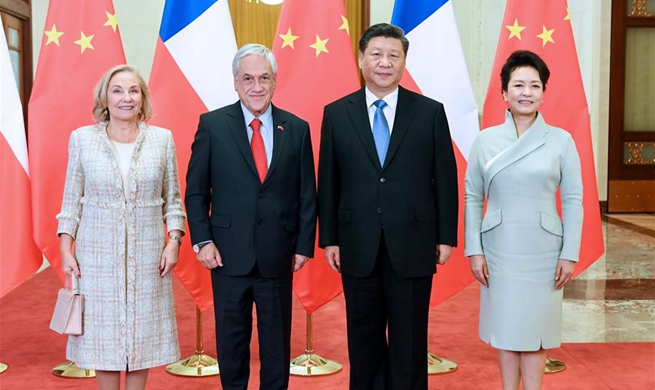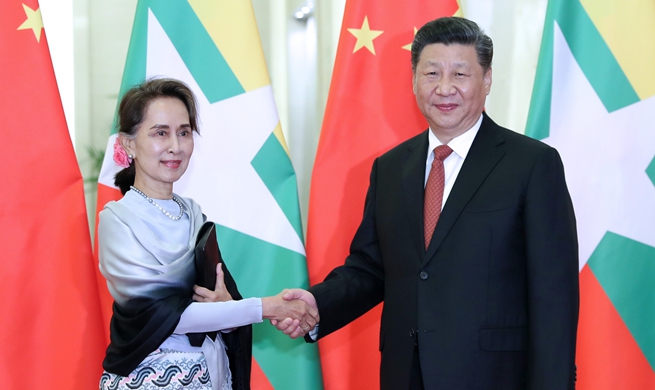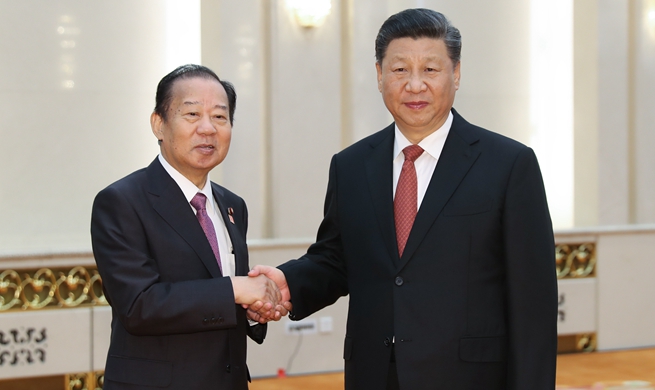by Julius Abraham and Moritz Rommerskirchen
BERLIN, April 25 (Xinhua) -- China will not only buy and manufacture cars, but will have a significant impact on the automotive industry in the future, since it is "infinitely open" to technological progress, experts and industry leaders have said.
The ongoing 2019 Auto Shanghai, opened to media since April 16 and will lower the curtain Thursday, has attracted over 1,000 exhibitors from 20 countries and regions, which shows the importance that carmakers attached to the Chinese auto market.
In a recent interview with Xinhua, Ferdinand Dudenhoeffer, founder and director of the Center for Automotive Research (CAR) at the university Duisburg Essen, said China has the best "economies of scale" in the market.
The exhibition is widely regarded as the leading trade fair for the entire Asian region, since more than a quarter of all new cars manufactured by carmakers worldwide are bought in China, according to CAR led by Dudenhoeffer.
Reflecting the growing importance of the Chinese market, most German automobile manufacturers are offering exclusive products such as long versions of their car models, which are very popular with Chinese buyers.
BMW presented the long version of its newest generation of the popular 3-series at this year's 2019 Auto Shanghai, which will be exclusively offered on the Chinese market. With the A35 L, German automaker Daimler has also introduced a new long version of one of its popular models.
Prior to the 2019 Auto Shanghai, Volkswagen's CEO Herbert Diess said that "China is increasingly becoming a powerhouse for automotive technology."
New technologies, such as electric drives, autonomous driving and the networked vehicle, are all being driven "very strongly" from China, Diess said.
By now, Volkswagen has opened four new plants in Chinese city Qingdao, Foshan and Tianjin in 2018 and currently operates a total of 23 production plants in China, according to Volkswagen, the largest German carmaker.
In March, Daimler announced that the production of its Smart models will be entirely outsourced to China, where the mini cars are set to be manufactured in cooperation with the Chinese car manufacturer Geely.
With electric mobility being one of the largest trends in the automotive sector, China is of extraordinary interest to car manufacturers.
According to data by CAR, 1.18 million electric cars were sold in 2018 throughout China, accounting for more than half of such cars sold globally. CAR founder Dudenhoeffer predicted that the sales this year in China would reach 2.2 million.
China has the "greatest dynamism" in terms of innovation, and the country is "infinitely open" to technological progress, Dudenhoeffer told Xinhua.
"China stands for the major topics of tomorrow's mobility," said Dudenhoeffer, adding that the battery powered car would have its "home" in China.
Bosch, a leading automotive supplier, believes the Chinese market would offer "enormous potential" from the medium to long term, said Stefan Hartung, chairman of Bosch's Mobility Solutions division, at the 2019 Auto Shanghai.
Continental, another major German automotive supplier, announced at the Shanghai car fair that it is planning to expand its production for electric mobility in China. The automotive supplier is exhibiting drive systems and electronic components for electric mobility at the trade fair and intends to invest "vigorously" in its new production sites in Tianjin and Changzhou, China.
In addition to large car manufacturers, many Chinese start-ups have emerged, especially in the field of electrically powered cars, boosting a technology race.
Xiaopeng Motors, a Chinese electric mobility start-up, for example, has presented the P7, a four-door limousine with a 47 kWh battery that is set to be able to drive up to 600 km purely electrically.
"China is changing from a market that we previously supplied with European technology to more of a market that will also drive the technology," said Bernhard Mattes, president of the German Association of the Automotive Industry (VDA).
"We will participate in it and that is why we are expanding our research and development activities here," Mattes added.
According to the CAR, 35 percent of the battery cells for electric cars globally will come from Chinese battery giant the CATL and the BYD, a Chinese electric carmaker.
That is why "the car of tomorrow" would simply be inconceivable without China, said Dudenhoeffer.

















